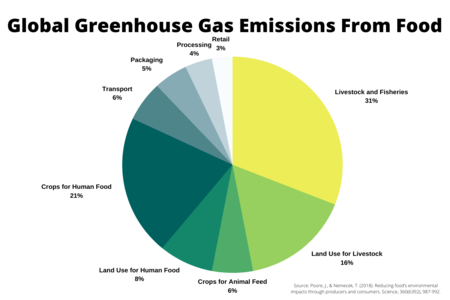We Bring Transparency to The Table
Through research, data, and educational content, we help food services reduce their climate impact through a climate labelling system. We calculate the carbon intensity of each menu item and communicate it through in-store labels with the mission to empower consumers to make more sustainable and informed food choices.
Our mission is to integrate the climate into our everyday food choices.
The global food system is a major contributor to climate change, responsible for up to a quarter of global greenhouse gas emissions . That is why our food choices matter when it comes to reducing global emissions. We envision a world where we produce, consume and compost food in a sustainable manner. By reducing our collective footprint, we will create a more sustainable food system & healthier future.
Impact of Food Choices on the Climate
Food production accounts for over a quarter of global greenhouse gas emissions, and half of the world’s habitable (ice and desert-free) land is used for agriculture. The urgency of the climate crisis and the significant impact that food has on greenhouse gas emissions means that food services and consumers have an important role to play in their food choices, by creating demand for less carbon-intensive foods. By providing transparency on the carbon emissions of food by using menu labels, consumers will be able to make more climate-informed choices. A 2020 survey found that consumers were in support of carbon labelling on products across all countries, with two-thirds of consumers saying they think it is a good idea (The Carbon Trust, 2020).

We believe the value of carbon labelling can extend to restaurant menus too. Our vision is that the resulting shift in demand away from carbon-intensive foods will lead to food services offering more low-carbon alternatives. Other restaurants around the world are starting to put climate labels on their food, such as Chipotle and Just Salad. Now is the perfect time to get ahead!
Importance of Sustainability in Business
Incorporating sustainability into your business model isn’t only great for the environment - it is also becoming widely accepted as a necessity for long-term business success. Today’s consumer wants to know where their food comes from, how it was produced, and, increasingly, what sustainability factors were included in the process. According to the Nielsen Company , 74% of Millennials and 72% of Gen-Z consumers are willing to pay more for sustainable products and services.

By implementing climate labels, we can help your business turn sustainability into a viable brand strategy for more sustainability-minded audiences, increasing your presence in the community, and improving long-term sales. With sufficient foresight, these can become opportunities to lead by example and become trend setters in the industry. Responding to heightened social, governmental, and consumer attention on the broader impact of the environment nowadays demonstrates how a more sustainable business model is a competitive advantage. It’s a win-win for you, our community, and for the environment.